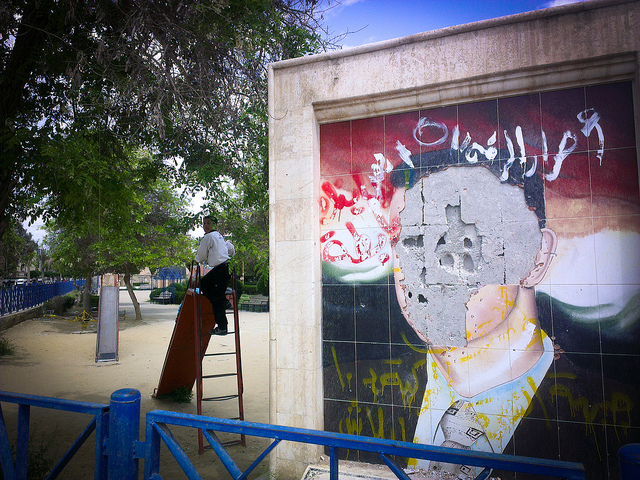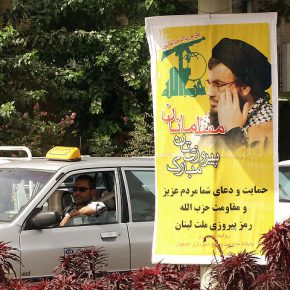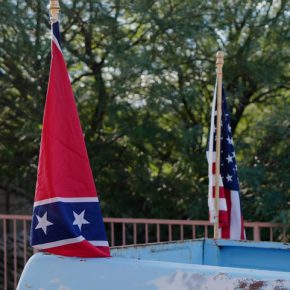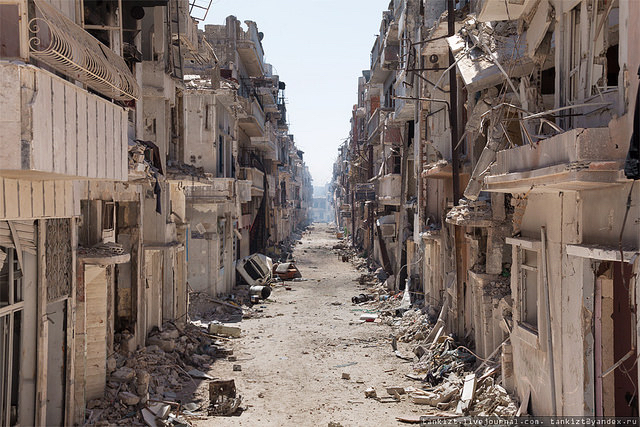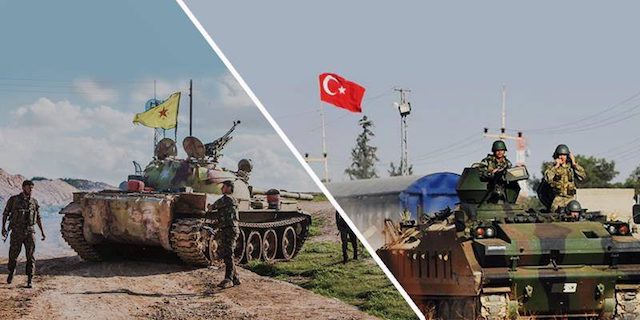Umm Omar had not seen her youngest son, Ali, in three years before he was killed by a US-led coalition airstrike on Raqqa city. He is just one of the roughly 500 people who have reportedly been killed by coalition airstrikes on ISIS’s former Syrian stronghold since June.
ISTANBUL – On July 27, Ali went to a water purification plant in Raqqa city to collect drinking water. As the 16-year-old Raqqa resident waited in line, a US-led coalition jet was somewhere overhead, preparing to launch one of the eight strikes targeting the so-called Islamic State that it would carry out near the militants’ former Syrian stronghold that day.
The coalition said it targeted ISIS tactical units and destroyed six fighting positions, a supply cache, an ISIS communication headquarters and an anti-air artillery system that day. What the report failed to mention, however, was that one strike hit the water plant, killing Ali, an aspiring calligrapher and the youngest of Umm Omar’s six children.
“Death has become a mercy for people in this tragic situation,” Umm Omar told Syria Deeply. The 50-year-old mother from Damascus is divorced and lives in Turkey, but all her children live in Raqqa with their father.
At least 48 other people were also reportedly killed and 40 others injured in Raqqa that day, due to artillery shelling and aerial bombardment in densely populated areas, according to the U.N. Office for the Coordination of Humanitarian Affairs (OCHA).
They are among the 480 people, including 119 children, who have been killed by coalition air raids on Raqqa during June and July, according to Airwars, an organization that tracks civilian casualties from international airstrikes in Iraq, Syria and Libya. Earlier this month, the United Nations expressed concern over the safety and protection of the 10,000 to 25,000 people who remain trapped in the city.
Syria Deeply spoke with Umm Omar about her youngest son, one of the hundreds of children who have been caught up in the battle over the city.
Syria Deeply: How did you hear the news of your son’s death? And when was the last time you saw him?
Umm Omar: I did not learn about his death right away. My children hid the news from me for six days, but they eventually had to tell me. My middle son told me that Ali was standing in line, waiting for his turn to collect drinking water from a water purification plant in Wadi Street in the center of Raqqa city, when an international coalition aircraft bombed the neighborhood, and he was killed. The building collapsed on top of those who were there.
The last time I saw him was three years ago, during my last visit to the city of Raqqa. I never imagined that it would be the last time I saw him. I went back to Damascus, and in 2016, I left for Turkey.
Syria Deeply: Where were you when you heard the news, and how did you feel?
Umm Omar: It was Tuesday, August 1. I was at work when I received a notification on WhatsApp. It was a voice message from my [other] son. I first thought he was checking in on me as he usually did, but when I listened to it, I was shocked by the news. He had tried to call me many times, but could not reach me because the internet was very bad.
I was in shock and could not talk to anybody. I went back to my sister’s house in the Fateh neighborhood of Istanbul. I still do not know how I got home, but I was calm. I had always expected bad news, because of the terrible conditions in Raqqa, and because I knew that my children were under constant bombardment. I told my sister and her husband about what had happened. I did not fall apart. I was able to hold myself together. I prayed and read the Qur’an for him and for his pure soul. [The day he died] I had a very strange feeling. I had just left work, when I suddenly felt my heart crashing in my chest, and that the world around me was all gray and gloomy. That day, a rainstorm hit Istanbul. It was a very heavy rain loaded with heavy hail.
Syria Deeply: When was the last time he spoke to you, and what did he say?
Umm Omar: He sent me a voice message through WhatsApp about a week before his death. He told me he was fine and asked me to pray for them. We could not make voice calls, except in rare cases, because of the ban on communication and on the Internet in Raqqa.
Syria Deeply: Would you tell us a little about Ali?
Umm Omar: He was my youngest son, 16 years old. We share the same birthday – he was born on January 1, 2001. He was loved by all of his five siblings. I have three girls, and two other boys; the oldest of them is named Omar. [Ali] was a loving young man. Despite his young age, he was always very mature. He wanted to become a calligrapher or an artist. Ever since he was in the second grade, he had very beautiful handwriting. He was very talented. He had a crush on my niece, Sabah. He always called her by her nickname, Sabbouha, and bought her chocolate with his allowance. He used to say that he wanted to marry her when he grew up.
Syria Deeply: Did you want to be in Raqqa to bid him farewell?
Umm Omar: I wish I had seen him after he was killed, but God deprived me of that moment. His death will continue to hurt my heart and my soul until I die.
Syria Deeply: Did you have a memorial service for him?
Umm Omar: Yes, we had one in my sister’s house. Death has become a mercy for people in this tragic situation. I cooked rice pudding and distributed it in his memory. I bought a bag of wheat and fed it to the birds, because he loved birds and had raised a bird named Abu Hamdi.
Syria Deeply: When you lived in Damascus, which is relatively safe, did you try to bring your children to live with you?
Umm Omar: I tried again and again, but their father refused to get out of Raqqa. He also prevented the kids from leaving. One time, in 2013, after long negotiations, I convinced their father to allow Ali to come to Damascus for treatment, because he suffered from stunted growth. He stayed with me for nine months, but then his father insisted on having him back in Raqqa.
On the other hand, I could not travel frequently to Raqqa, because women are not allowed to travel alone. They are required to have a male, blood relative to travel with.
Syria Deeply: How do you manage your grief?
Umm Omar: I believe that all is God’s plan, and it happens for a reason. God takes care of us and finds ways to help us through our losses and grief. Two days ago, my older daughter, Yasmin, had a boy. We called him Ali. The news made me smile, despite all my sadness.
This article originally appeared on Syria Deeply, and you can find the original here. Photograph courtesy of Beshr Abdulhadi. Published under a Creative Commons license.
